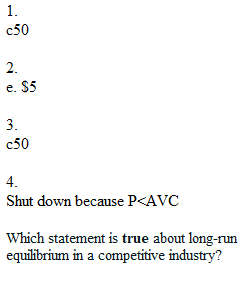


Q 1.Mo owns a Coffee truck which operates in a perfectly competitive industry. He faces the following cost schedule (notice that his coffee maker makes ten cups at a time, and that he has a daily fixed cost of operating the truck). If the market price of a cup of coffee is $2.00, what Q would a profit-maximizer choose to produce? 2.Mo owns a Coffee truck which operates in a perfectly competitive industry. He faces the following cost schedule per day (notice that his coffee maker makes ten cups at a time, and that he has a daily fixed cost of operating the truck). The market price of a cup of coffee is $2.00. Suppose that Mo produces at the profit maximizing/loss minimizing level Q*. How much profit/loss does he earn? 3.Mo owns a Coffee truck which operates in a perfectly competitive industry. He faces the following cost schedule (notice that his coffee maker makes ten cups at a time, and that he has a daily fixed cost of operating the truck). If the market price of a cup of coffee is $1.00, what Q would a profit-maximizer / loss- minimizer choose to produce? 4.Mo owns a Coffee truck which operates in a perfectly competitive industry. He faces the following cost schedule (notice that his coffee maker makes ten cups at a time, and that he has a daily fixed cost of operating the truck). If the market price of a cup of coffee is $1.00, what should Mo do? 5.Mo owns a Coffee truck which operates in a perfectly competitive industry. He faces the following cost schedule (notice that his coffee maker makes ten cups at a time, and that he has a daily fixed cost of operating the truck). If the market price of a cup of coffee is remains at $1.00, what will happen in this entire coffee truck industry in the short-run and in the long-run?
View Related Questions